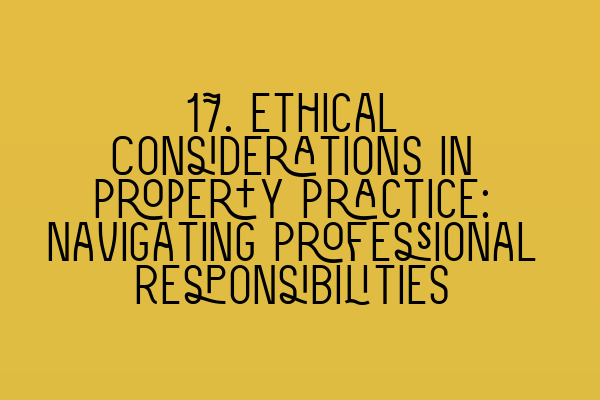Ethics play a crucial role in every aspect of the legal profession, and property practice is no exception. As a property solicitor, it is important to navigate the professional responsibilities that come with the job while ensuring ethical conduct throughout the process. In this blog post, we will explore 17 ethical considerations that property practitioners must keep in mind.
1. Confidentiality
Confidentiality is a cornerstone of the solicitor-client relationship. As a property solicitor, you are entrusted with sensitive information related to your clients’ property transactions. It is essential to maintain strict confidentiality and safeguard this information from unauthorized disclosure.
2. Conflict of Interest
Avoiding conflicts of interest is of utmost importance in property practice. You must identify any potential conflicts and take appropriate actions to prevent them from compromising your professional judgment. This includes conducting conflict checks and obtaining informed consent from all affected parties if a conflict arises.
3. Full Disclosure
Transparency is key in property transactions. As a solicitor, you have a duty to provide your clients with all relevant information to make informed decisions. This includes disclosing any potential conflicts, risks, or adverse consequences that may arise from the transaction.
4. Client Intake and Due Diligence
When taking on a new client, it is essential to conduct due diligence to ensure the client’s legitimacy and the nature of their instructions. This includes verifying their identity, source of funds, and assessing the potential risks associated with representing them.
5. Anti-Money Laundering and Proceeds of Crime
Property transactions can be vulnerable to money laundering and other criminal activities. Property solicitors have a legal and ethical duty to actively prevent money laundering by conducting Know Your Client (KYC) procedures, reporting suspicious activities, and complying with anti-money laundering regulations.
6. Professional Competence
Property solicitors should maintain a high level of professional competence to deliver quality legal services. This involves staying updated with changes in property law, attending relevant training programs, and continuously improving knowledge and skills.
7. Legal Research
Thorough legal research is essential in property practice. Clients rely on your ability to provide accurate and up-to-date advice. Make use of reliable legal resources and stay informed about recent judgments, legislation, and any other developments that may impact your clients’ interests.
8. Informed Consent
Obtaining informed consent from your clients before taking any significant action is crucial. Ensure that your clients understand the implications and consequences of their decisions. Obtain their consent in writing whenever necessary, and keep detailed records of such consent for future reference.
9. Professional Indemnity Insurance
Having professional indemnity insurance is both a legal requirement and an ethical obligation for property practitioners. It provides protection for you and your clients in the event of professional negligence or errors and omissions.
10. Managing Client Expectations
Clear communication is vital to manage client expectations in property practice. Be honest about the limitations and risks of the transaction, and ensure that your clients have realistic expectations about the outcome. Keep them informed about the progress of their matter and promptly address any concerns they may have.
11. Fee Transparency
Transparency in billing is an ethical obligation for property solicitors. Clearly communicate your fee structure and any additional charges to your clients upfront. Provide regular updates on costs incurred and ensure that all billing is fair, reasonable, and in line with the services provided.
12. Duty to the Court
Property solicitors have a duty to the court, which includes maintaining the integrity of the legal system. Act honestly, ethically, and with utmost professionalism when dealing with courts or tribunals. Never make false statements, suppress evidence, or engage in any conduct that may undermine the administration of justice.
13. Equality and Diversity
Promoting equality and diversity is essential for a fair and inclusive legal profession. Property solicitors should treat all clients and colleagues with respect and without discrimination based on race, gender, religion, disability, sexual orientation, or any other protected characteristic.
14. Social Responsibility
Property solicitors have a responsibility to contribute positively to society. Consider pro bono work or offering discounted services to those who cannot afford legal representation. Contribute to your local community and support charitable initiatives related to property law or access to justice.
15. Professional Conduct
Maintaining high standards of professional conduct is crucial in property practice. Comply with the Solicitors Regulation Authority (SRA) Code of Conduct and any other applicable professional regulations. Be courteous, respectful, and act in a manner that upholds the reputation of the profession.
16. Continuing Professional Development
Continuously investing in your professional development demonstrates your commitment to providing the best possible service to your clients. Attend industry conferences, seminars, and training sessions to stay updated with changes in property law and enhance your skills as a property solicitor.
17. Ethical Dilemmas
Ethical dilemmas may arise in property practice, where you have to make difficult decisions that may affect your clients’ interests or your professional reputation. Seek guidance from senior colleagues, legal ethics helplines, or ethical committees to ensure you navigate such situations with integrity.
As a property solicitor, navigating these ethical considerations is paramount to maintaining the trust and confidence of your clients, colleagues, and the wider legal profession. Remember to stay updated with professional regulations, seek guidance when necessary, and always act in the best interests of your clients.
For further resources and information on preparing for the SQE exam and legal practice, check out these related articles:
